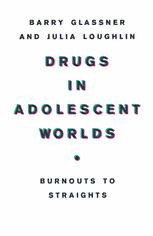
Drugs in Adolescent Worlds: Burnouts to Straights PDF
Preview Drugs in Adolescent Worlds: Burnouts to Straights
DRUGS IN ADOLESCENT WORLDS BURNOUTS TO STRAIGHTS Also by Barry Glassner ESSENTIAL INTERACTION ISM CLINICAL SOCIOLOGY (with J. Freedman) DISCOURSE IN THE SOCIAL SCIENCES (with J. Moreno) A RATIONALIST METHODOLOGY FOR THE SOCIAL SCIENCES (with D. Sylvan) Also by Julia Loughlin RESEARCH ON HUMAN SUBJECTS (with B. Barber, J. Lally, D. Sullivan) DRUGS IN ADOLESCENT WORLDS Burnouts to Straights Barry Glassner Professor of Sociology, Syracuse University, New York and Julia Loughlin Associate Professor of Sociology, Syracuse University, New York First published in Great Britain 1987 by MACMILLAN PRESS LTD Houndmills, Basingstoke, Hampshire RG21 6XS and London Companies and representatives throughout the world A catalogue record for this book is available from the British Library. ISBN 978-0-333-53470-0 ISBN 978-1-349-20743-5 (eBook) DOI 10.1007/978-1-349-20743-5 First published in the United States of America 1987 by ST. MARTIN'S PRESS, INC., Scholarly and Reference Division, 175 Fifth Avenue, New York, N.Y. 10010 ISBN 978-0-312-21992-5 (cloth) ISBN 978-0-312-04207-3 (paperback) Library of Congress Cataloging-in-Publication Data Glassner, Barry Drugs in adolescent worlds. Includes index. I. Youth-United States-Drug use. 2. Drug abuse United States. 3. Drug abuse surveys-United States. I. Loughlin, Julia. II. Title HV5824. Y68G55 1986 362.2'93'088055-dc 86-1278 CIP © Barry Glassner and Julia Loughlin 1987 All rights reserved. No reproduction, copy or transmission of this publication may be made without written permission. No paragraph of this publication may be reproduced, copied or transmitted save with written permission or in accordance with the provisions of the Copyright, Designs and Patents Act 1988, or under the terms of any licence permitting limited copying issued by the Copyright Licensing Agency, 90 Tottenham Court Road, London WIP 9HE Any person who does any unauthorised act in relation to this publication may be liable to criminal prosecution and civil claims for damages. 12 II 10 9 8 7 6 5 4 3 04 03 02 01 00 99 98 97 96 95 For Myron Glassner, Eva F. Glassner, J. Gerald Loughlin and Mary Callahan Loughlin Contents ~ifTh~ ~ Acknowledgements x 1 COMPETING EXPLANATIONS: EPIDEMIOLOGY, POLITICS, SOCIAL WORLDS 1 The Epidemiological Model 2 The Political Model 6 The Drug User's World 8 Adolescent Worlds 10 Development of a Social Worlds Approach 13 2 A METHODOLOGY FOR LISTENING 16 Research Design 16 Cataloguing the Data 24 Advantages and Drawbacks of the Design 29 Can We Believe the Kids? 32 3 WHY DO ADOLESCENTS USE DRUGS? 41 Boredom and Depression 43 Control 50 Thresholds 55 Passing the Threshold 60 A Part of Everyday Life 61 4 HOW ADOLESCENTS USE DRUGS 65 Routine Recreational Use 66 Sociability 69 Special Recreational Use 74 Availability 77 Instrumelltal Drug Use 82 'Marijuana Leads to Heavier Drugs' 87 5 DISTRIBUTING AND UNDERSTANDING DRUGS 92 The Drug Distribution Network 95 Folk Pharmacology 105 Folk Epidemiology 114 Drugs and Crime 116 VII VllI Contents 6 WHY ADOLESCENTS A VOID DRUGS: LIGHT USERS AND NON-USERS 124 Drug Use and Social Identity 130 Light Users 134 7 PEER PRESSURE 146 Peers in Context 152 First Use of a Drug 160 The Importance of Friends 166 What They Do Together 171 'Peer Pressure' Prejudices 176 8 FAMILIES 181 Non-users and Their Parents 182 Parents Who Use Drugs 184 Drug Use and Conflict: Not Telling, Not Asking 189 Explicit Negotiation 194 The Quality of Relationships 199 9 THE FUTURE 206 Adulthood Versus Adolescence 207 Dating and Working 209 Good Persons 216 Projected Future Lives 218 The Next Generation 229 10 SEEING DEFECTIVE INDIVIDUALS 235 Understanding Patterns 236 The Social Structure of Boredom, Depression and Drug-Taking 241 The Issue of Control 245 'Social Deviants' and Drug Effects 249 11 SEEING SOCIAL WORLDS 258 Drugs Fit into Historically Located Groups 261 Peers 264 World-making 267 Social Worlds 273 Glossary 277 Appendix A: The Subjects 280 Bibliography 285 General Index 296 Subject Index 298 List of Tables 1 The Sample 20 2 Currency of Subjects' Drug Choices 82 3 Depression and Boredom Inverted in Drug Use 271 ix Acknowledgements This research was supported in part by a research agreement programme (80-IJ-CX-0049-S1) to Narcotic and Drug Re search, Inc., by the National Institute of Justice, US Depart ment of Justice. Additional support was provided by The Maxwell School, Syracuse University through the Health Studies Program and the Sociology Department. Points of view in this book do not necessarily represent those of the funding agencies. We wish to thank Bruce D. Johnson, director of the larger research effort of which this was a part, for his support and comments throughout the five years in which the collabora tive research effort took place. For their comments or other assistance, we also thank Guthrie Birkhead, Rosa Diaz, Celia Kamps, Douglas Lipton, Ephraim Mizruchi, Yancey Padget, Sal Restivo, Robin Room, Claire Rudolph, Gary Spencer, Stuart Thorson and Erica Wood. A project of this size requires many talented researchers. Four graduate research assistants on the study - Bruce Berg, Cheryl Carpenter, Margret Ksander and Mary Stuck - have made crucial contributions to the collection, organization and interpretation of the data. In addition to aiding the discussion presented in this volume, each has been engaged in his or her own analysis and is preparing research papers or books. Nelson Pardee's dexterity as a systems analyst gave us access to the data. For clerical assistance we thank Barbara Cico, Mary Demetrick and Ruthe Kassel. x
